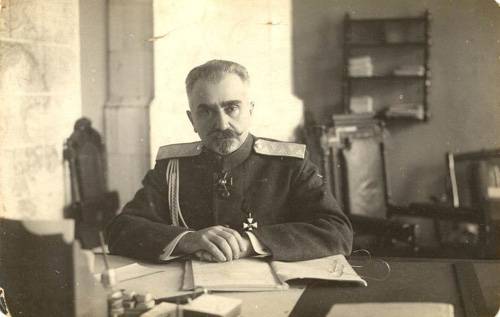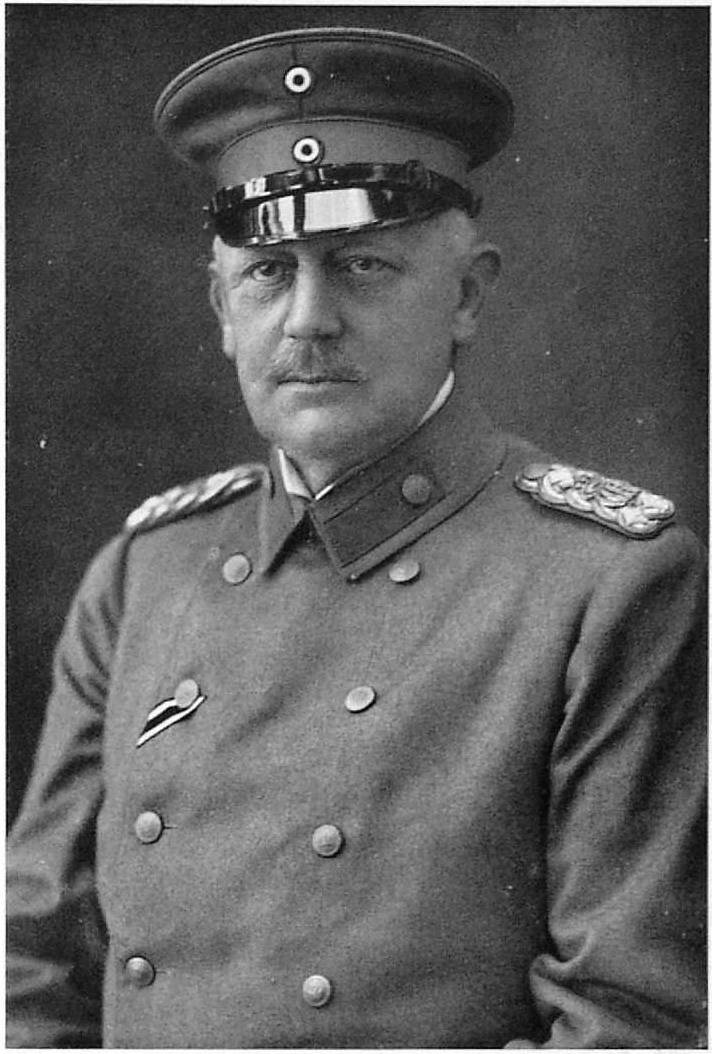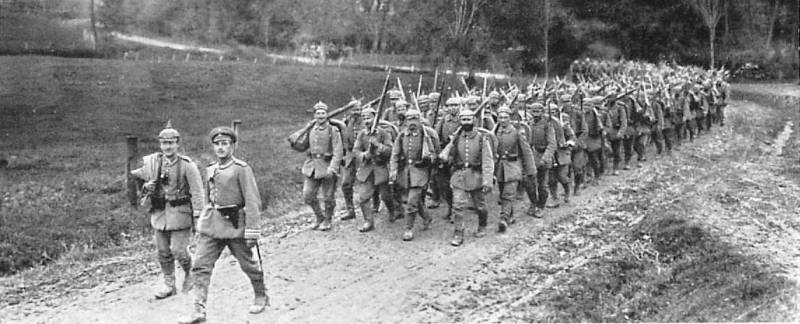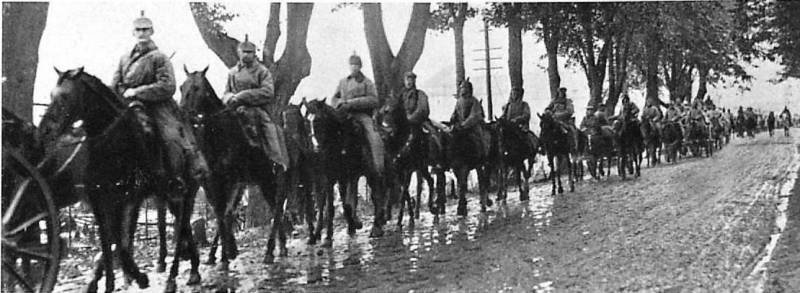The decisive battle of the First World War. East Prussian operation 1914 of the year. About the transfer of buildings from the West
Under the influence of the victories of the 1 and 2 armies under Gumbinnen and at Orlau-Frankenau, the German High Command decided, by weakening the strike force on the French front, to transfer a number of formations to East Prussia. The 3 corps came into motion: the Guards Reserve, being withdrawn from the 2 Army, the 11 Army from the 3 Army (and also the 8 Cavalry Division) departed to East Prussia, and the 5 Army Corps was withdrawn from the composition of the army of the Kronprinz and prepared for the transfer (although it was not sent, but could not take part in the decisive battles in France). Moreover, the Guards Reserve and 11 Army Corps were taken from the composition of the troops before this weakened and responsible right flank.
Yu. N. Danilov described the reasons why the corps were removed from the shock flank of the German Western Front: the situation in the east seemed urgent to the German command, and such connections were assigned to the transfer that could be shipped by rail faster than others. The general noted that the decision taken by the German High Command to transfer forces (and from the flank that had bypassed the French) to the Russian front was a factor of great importance for the further course of the war on the Western Front. This decision not only numerically weakened the blow delivered to the Anglo-French, but also denied the destructive influence on the morale and will to victory of the German command. [Danilov Yu. N. Russia in World War. C. 180].

Infantry General Yu.N. Danilov
The strategic planning of A. von Schlieffen - G. von Moltke was destroyed - the Germans did not have enough of these compounds in the West, especially in the days of the Marne Battle.
So considered Soviet military historians and experts.
Professor Prof. A. Melikov, describing the "indiscriminate mad offensive" of Russian troops in East Prussia, noted the fact of weakness in the strategic purposefulness on the part of Moltke Jr., who withdrew from the main direction (right flank of the German armies advancing on Paris) I transferred them to the Russian front. This decision had the hardest consequences for the German troops - after all, these buildings, so necessary during the Battle of the Marne, in the right place and the right time was not [Melikov V. A. Strategic deployment from the experience of the First Imperialist War 1914-1918. and the Civil War in the USSR. T. 1. M., 1939. C. 306].
Colonel F. Khramov wrote that such a serious weakening of the shock group of the right flank of the German forces in the West was certainly one of the most important reasons for the unsuccessful outcome of the Marn battle. And the Russians, who forced the German command to begin the transfer of part of the forces from the Western Front to the Eastern Front, rendered serious assistance to France - which was of crucial strategic importance for the further course of the war. [Temples F. Decree. cit. C. 20].
Major General of the Soviet Army, member of the First World and Civil Wars M. R. Galaktionov completely agrees with them. [Cm. Galaktionov M.R. Paris. 1914 M.-SPb., 2001].
Military historians of the Russian emigration agree with Soviet historians.
Thus, the front-line general Baron A. P. Budberg noted that the absence of the 11 Army and Guards reserve corps, which were taken from the right-flank 3 and 2 armies moving on the shock flank of the German offensive, had a negative effect on the Germans 21-24 August - in the Border Battle in the region of Dinan-Charleroi. The critical 5-French army suffered a very serious failure - and it escaped from the encirclement and subsequent destruction only because the German 2-th and 3-th army, acting against it, were weakened by these 2 corps. The German armies did not have enough reserves to complete this operation. This, in turn, saved the British army, because after the liquidation of its neighbor, it would be cut off from the French and defeated. But even this is insignificant in comparison with those extremely important consequences - fatal for the Germans and saving for the Anglo-French - which became the inevitable consequence of the absence of these buildings in the fateful days of the Marnian battle of 4 - 9 of September [Budberg A.P. The Armed Forces of the Russian Empire in the performance of all-Union tasks and duties during the 1914 — 1917 war. Paris, 1939. C. 6].
A war veteran, Professor General N. N. Golovin, believed that the transfer of German corps from the French front to the Russian side in August 1914 was the most blatant strategic mistake that any of the belligerents made during the First World War [Golovin N.N. From stories 1914 campaigns on the Russian front. The plan of war. Paris, 1936. C. 253].
But maybe this is an exaggeration, and the role of the transfer did not have such a crucial strategic tinge at all? What do the winners themselves say on Marne? After all, according to the logic of things, it makes no sense to focus on the merits of an ally - on the contrary, one should only emphasize their contribution to the achievement of this strategic victory.
Marshal J. Joffre testified to the Russians deep gratitude for effective helpthey showed the French army in a tragic time when Germany tried to crush Belgium, France and England. Consciously breaking the basic rules of war for the good of the coalition, Russia threw its forces into East Prussia earlier than they were concentrated and ready. Marshal noted that he would never forget those heavy sacrifices to which the Russian army consciously and heroically doomed themselves, forcing the enemy to turn on her [Budberg A.P. Decree. cit. C. 7].
Marshal F. Foch admitted that by “active intervention” the Russian troops had diverted a significant part of the German forces and this allowed allies "Win on the marne" [Foch F. Memoirs (war 1914 — 1918). M., 1939. C. 186].
General Dupont wrote that when the 2 of the German corps and the cavalry division were withdrawn from the French front, "These measures were probably our salvation". The general, exclaiming, recommended presenting what serious consequences could have happened if 7 of September the Guards reserve corps were on the front between the 1 and 2 armies, and the 11 body and 8 September kavdivision 9 of September were in their 3 Army at Fe Champenois. He clearly mentioned the weakness of the character of G. Moltke, who had removed the 2 corps and the division, in order to send them to Russia as the first reason for the loss of the Marne battle by the Germans [DuPont. German High Command (from the German point of view). M., 1923. C. 88].
General S. Mangein wrote that the Allies should never forget about the help of Poccia, who launched the military campaign “unexpectedly quickly” - thanks to which the 2 of the German corps departed from the French front, being absent from it during the Marne battle. General A.A. Nissel, noting how critical the situation of the Allies was on the Marne, believed that the reduction of the German army of the Western Front on the 2 corps and the division was the burden that tipped the scales of fate onto the side of the Allies. General Kunyak wrote that after a heavy defeat at Gumbinnen, the German Main Apartment made a serious mistake by sending the 2 corps against the Russians - because of this, it did not have strategic reserves during the Marne battle. Colonel de Witt Guizot, noted the merits of Russia, which, in order to help out the Allies, bravely launched an offensive, knocking the Germans over from Gumbinnen. The German General Staff was forced to withdraw infantry divisions from the French front 4 - and the Russians did a great service to their allies. [Budberg A.P. Decree. cit.].
The same was the opinion of other allies.
W. Churchill, noting the speed of the Russian invasion of East Prussia, wrote that this fact hit the nerves of the ranks of the German General Staff that the 2 German corps was heading east from the right wing of the German Marne forces. As noted by W. Churchill - "This fact had a decisive influence on the fate of the outcome of the battle" and the king and his heroic warriors should "be given great honor" [Budberg A.P. Decree op].
A British military agent in Russia, A. Knox, also noted that the absence of corps and a cavalry division from the right wing of the German Western Front to the East Prussia in France was of paramount importance for the battle of Marne. [Knox A. With the Russian army 1914-1917. London, 1921. P. 92].
American Colonel H. T. Naylor wrote that the Battle of Marne "was won by the Russian Cossacks" [Budberg A.P. Decree op].
The British military theorist and war veteran B. Liddel-Harth adhered to the same point of view. [Liddel — Garth B. Encyclopedia of the art of war. M.-SPb, 2003. C. 470-473].
On the march
Well, the Germans, what is their opinion?
E. Ludendorff, the “brain” of the German Eastern Front, noted the special importance of the fact that the reinforcements allocated for the east “were taken from the right wing, on which the decisive task lay” [Ludendorff E. von. Decree. cit. C. 61]. He wrote: “The right wing of the West German army was not strong enough and captured an insufficient front,” noticing that the absence of the Guards reserve and 11 corps felt ominously. [Ibid. C. 72]. The general complains that if G. Moltke didn’t send these units to East Prussia, then everything would be fine ... the offensive on the Western Front was wrecked because of the fact that Moltke had taken these troops - that’s why the “drama on Marne” [Budberg A.P. Decree. cit. C. 9].
E. von Falkenhayn testified that it made itself felt strongly about the weakening of the Germanic Western Front — it significantly increased the numerical superiority of the Anglo-French. The compounds withdrawn for transfer were drawn from the shock wing of the front - and their absence was especially sensitive during the decisive battle on the Marne, and after it [Falkengine E. von. High Command 1914 — 1916 in its most important decisions. M., 1923. C. 20]. Moreover, the general reiterated this sad fact: “The weakening of the western army ... was unacceptable. ... the absence of troops taken from the Western Front made me feel acutely - and it is hardly possible to sufficiently emphasize the disastrous influence of this fact on the course of the war [Ibid. C. 29]. He noted that the task of achieving a quick military solution, which was the basis of the German plan of war, was reduced to zero. Especially fraught with the consequence that the troops assigned to the Russian front were taken from the right - strike - flank. [Budberg A.P. Decree. cit.].
Colonel-General G.I.-L. von Moltke noted that the transfer of forces from west to east due to the surprise strike of the Russian armies in East Prussia "was a mistake that avenged itself on Marne." The situation on the Russian front "required to send reinforcements to this front before a decisive victory was achieved in the west" [Yemets V. A About the role of the Russian army in the first period of the world war 1914 — 1918. // Historical notes. Issue 77. M., 1965 C. 76].

"Responsible" transfer G. von Moltke
Field Marshal P. Hindenburg complained that this transfer led to the separation of the existing forces - they deviated from one goal, and the other could not reach [K. Perepelovsky. The Role and Importance of the Russian Front in the 1914 — 1917 War. according to foreign military sources // Military Profit. 1971. No. 111. C. 9].
Representatives of the German officers adhered to the same point of view. For example, Major G. Schmidt wrote that the impression of the Gumbinnen defeat was very strong - and from the troops fighting near Paris, 2 corps and a cavalry division were sent to East Prussia. This event made it impossible to win on the Marne, respectively, led to a retreat, and had a detrimental significance for the entire course of the war, because it broke the hopes for its victorious and speedy end [Budberg A.P. Decree. cit. C. 10].
The military historian O. von Moser also considered sending two corps from the right flank of German forces in the West to East Prussia - a particularly unsuccessful and fatal event of the German command. [Moser O. von. A brief strategic overview of world war 1914 - 1918's. M., 1923. C. 32].
Thus, the strategic results of the East Prussian operation were expressed in that the Russians, keeping the German troops from assisting the allies-Austrians, were able to inflict a severe defeat on Austria-Hungary on the main thing - the Galician - theater, and in the decisive period of operations on the French front were distracted by 2 corps itself and a cavalry division from the German forces operating on the Marne.
The latter circumstance was the most important outcome of the operation for the entire Entente bloc and a key factor for the outcome of the war. After the transfer of these formations, the Entente had already won the First World War in the long run - after all, Marne had marked a gradual transition to a protracted positional war. And a long war on several fronts attracted the inevitable defeat of Germany and, accordingly, the entire bloc led by it.


Information